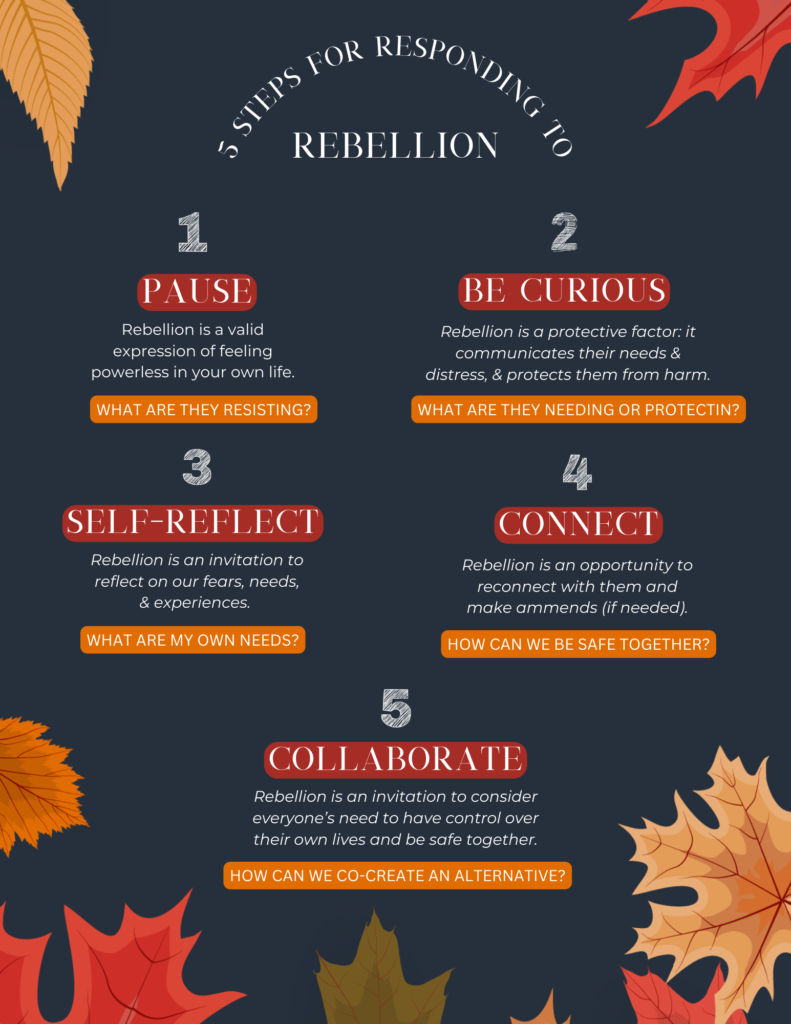Kids of all ages are notorious for their rebellion - we hear,"kids these days have no respect," and so many other disparaging comments about their behaviors.
But really, kids have a healthy response to being controlled;, for protecting the little bit of power and control they do have over their lives.
They have so little control: they may not get to choose their meals or when to eat, whether or not they go to school, when they get up or go to bed, and they may not even get to choose their favorite clothes to wear for the day.
So they naturally want to protect the little bit of power and control they do have over their lives. And they may rebel outright by saying, "no!" Or they may rebel by lying or sneaking, if they are afraid they will get in trouble or if they think they won't be understood or believed.
So what do we do when rebellion shows up and makes us worry? How do we support and help our young rebels as they learn important life and relational skills? And how do we respond to rebellion in ways that also build a strong and safe parent-child relationships, even with our teens?
Here are 5 ways to respond to rebellion that will help them learn important life and relational skills that also build a strong and safe parent-child relatioship...even with your teen!
- PAUSE: Rebellion is a valid expression of feeling powerless in your own life. What are they resisting?
Everyone wants to have some semblance of control over their lives, whether it when or what they eat, how they spend their free time, or whether or not they hug someone. Young people do too.
- BE CURIOUS: Rebellion is a protective factor: it communicates their needs & distress, & protects them from harm. What are they needing or protecting?Curiosity helps us better understand how to move forward. We see they're rebelling, now we need to know WHY. Are they needing more power? Are they trying to protect themselves? What do they know about this situation or themselves that I do not know right now?
- SELF-REFLECT: Rebellion is an invitation to reflect on our own fears, needs, & experiences. What are my own needs?As parents, our own fears, needs and experiences are always infuencing us. Sometimes they can be quite loud, and sometimes we don't even know they are there. Now that we've paused and gotten curious about our child, we can also get curious about ourselves - we can self-reflect. What's going on for myself? What am I afraid of right now? What do I need to move through this in a regulated way? What experiences of my own might be getting in my way? What experiences have I had that might help this moment?
- CONNECT: Rebellion is an opportunity to reconnect with them and make ammends (if needed). How can we be safe together?Children who feel disconnected from us do not feel safe, which makes it more difficult to learn, tell the truth, pause, curious, and self-reflect. And when we feel disconnected from them, it is difficult for us to have empathy and patience. We need to feel connected and safe with each other in order to move to the next step.
- COLLABORATE: Rebellion is an invitation to consider everyone’s need to have control over their own lives and be safe together. How can we co-create an alternative?When we collaborate on an alternative to the situation they were rebelling against, it means that we are considering their needs and perspective and our own at the same time.

